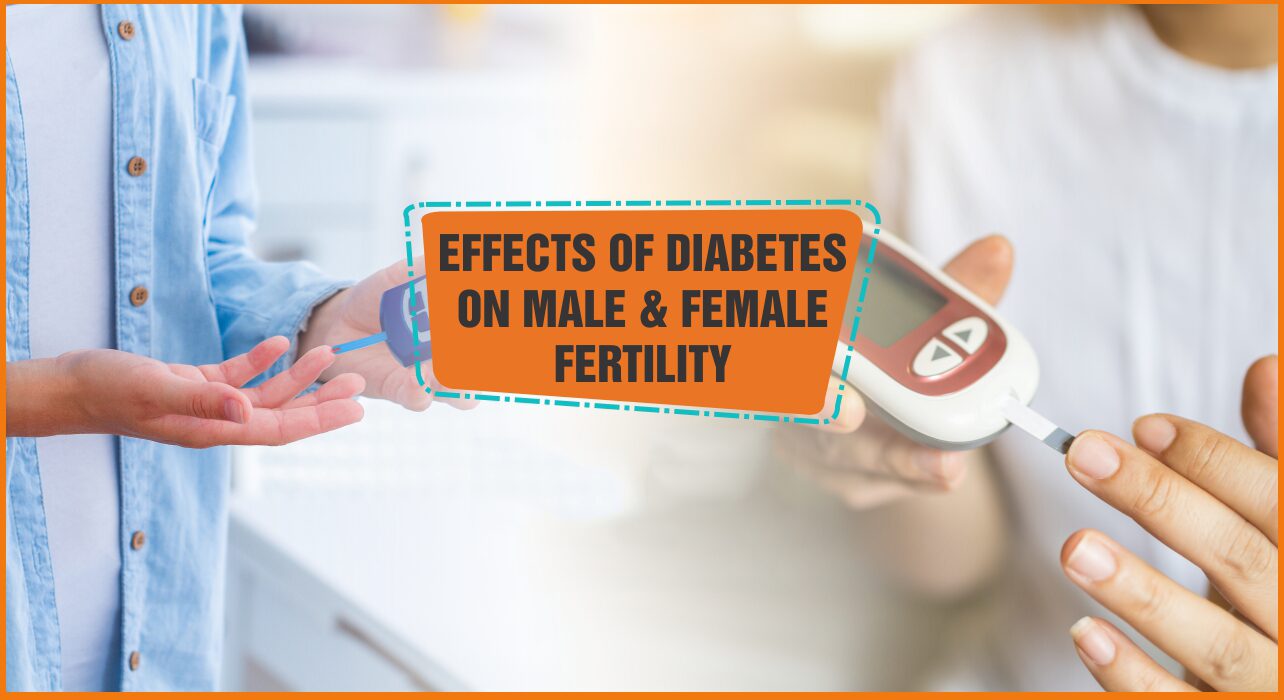
Diabetes, a chronic condition characterized by high blood sugar levels, can have significant impacts on both female and male fertility. We will delve into the effects of uncontrolled diabetes on reproductive health, the connection between diabetes and male infertility, and the effects of gestational diabetes on fertility. Furthermore, we will discuss how managing diabetes through proper diabetes management and seeking treatment options can improve fertility outcomes for individuals with diabetes.
Introduction to the relationship between diabetes and infertility
Diabetes and infertility are closely linked, with uncontrolled diabetes potentially hurting reproductive health. Both females and males with diabetes may experience fertility issues due to changes in hormone levels and damage to the reproductive organs.
In addition, gestational diabetes during pregnancy can also lead to complications and increase the risk of infertility. Properly managing diabetes through lifestyle changes and seeking treatment options can improve fertility outcomes for individuals with diabetes.
Exploring the Link between Diabetes and Infertility –
When exploring the link between diabetes and infertility, it’s important to understand that diabetes can affect both males and females. Uncontrolled diabetes can lead to hormonal imbalances and damage to the reproductive organs, resulting in infertility.
For females, diabetes can disrupt the menstrual cycle and hinder ovulation, while males may experience decreased sperm quality and quantity. By properly managing diabetes and seeking appropriate treatment, individuals with diabetes can improve their chances of conceiving. Remember, early intervention is key to addressing the relationship between diabetes and infertility.
Diabetes and Female Infertility
Diabetes can significantly impact female fertility. Uncontrolled diabetes can disrupt the menstrual cycle, making it difficult for women to ovulate regularly. Hormonal imbalances caused by diabetes can also affect the health of the reproductive organs, leading to infertility. Women with diabetes need to manage their blood sugar levels and seek appropriate treatment to improve their chances of conceiving. By addressing diabetes and prioritizing reproductive health, women can increase their chances of a successful pregnancy.
The link between diabetes and female infertility
Diabetes can have a significant impact on female fertility. Uncontrolled diabetes can disrupt the menstrual cycle, making it difficult for women to ovulate regularly. This can lead to irregular periods or even the absence of periods altogether. Hormonal imbalances caused by diabetes can also affect the health of the reproductive organs, such as the ovaries and uterus, further contributing to infertility. Women with diabetes must manage their blood sugar levels and seek appropriate treatment to improve their chances of conceiving.
Surrogacy costs resources worldwide:
Top 4 cheapest countries for surrogacy
Best Countries for Surrogacy 2023- Top International Destinations
Risks of international surrogacy
Global International Surrogacy Options
Surrogacy In Mexico-Everything Intended Parents Need To Know
Cheapest Country For Gay Surrogacy- Colombia
Low-cost surrogate mother in Argentina
Effects of uncontrolled diabetes on female reproductive health
Uncontrolled diabetes can have detrimental effects on female reproductive health. It disrupts the hormonal balance, impacting the regularity of the menstrual cycle and ovulation. This can lead to irregular periods or the absence of periods altogether, making it difficult for women to conceive. Additionally, diabetes can negatively affect the health of the ovaries and uterus, further contributing to infertility. Managing diabetes is crucial in maintaining optimal reproductive health.
Diabetes and Male Infertility
Diabetes can also have a significant impact on male fertility. Men with diabetes may experience a decrease in sperm quality and quantity, leading to difficulties in achieving pregnancy. High blood sugar levels and complications from diabetes, such as nerve damage and reduced blood flow, can affect the reproductive organs and impair sperm production. Men with diabetes need to manage their condition to improve their chances of fertility.
The connection between diabetes and male infertility
Men with diabetes may experience a decrease in sperm quality and quantity, leading to difficulties in achieving pregnancy. High blood sugar levels and complications from diabetes, such as nerve damage and reduced blood flow, can affect the reproductive organs and impair sperm production. You need to manage your diabetes properly to improve your chances of fertility.
Impact of diabetes on sperm quality and quantity
Diabetes can have a significant impact on sperm quality and quantity in men. High blood sugar levels can lead to oxidative stress, which can damage sperm DNA and reduce sperm motility and viability. Additionally, diabetes can affect hormone levels and impair the function of the testes, further compromising sperm production. Managing your diabetes effectively is crucial in improving your sperm health and fertility outcomes.
Gestational Diabetes and Infertility
Gestational diabetes, which occurs during pregnancy, can also have an impact on fertility. Women with gestational diabetes are at higher risk of developing type 2 diabetes later in life, which can further affect their fertility. Additionally, gestational diabetes can lead to complications during pregnancy, such as preeclampsia and preterm birth, which can also impact fertility. Seeking proper medical care and managing gestational diabetes is essential to minimize these risks and improve fertility outcomes.
Managing Diabetes to Improve Fertility
Managing Diabetes to Improve Fertility: To improve your chances of conceiving, it is crucial to properly manage your diabetes. Maintaining stable blood sugar levels through proper diabetes management is key. Make sure to monitor your blood sugar regularly and take prescribed medications as directed by your healthcare provider.
Follow a healthy lifestyle by engaging in regular exercise, following a balanced diet, and managing your weight. These steps will help improve your overall health and increase your chances of successful conception.
Here are some practical tips to improve fertility outcomes:
- Monitor your blood sugar regularly and adhere to your prescribed medication regimen.
- Follow a healthy lifestyle, including regular exercise, a balanced diet, and weight management.
- Avoid smoking and excessive alcohol consumption.
- Seek support from a healthcare provider experienced in managing diabetes and fertility.
Seeking Help: Treatment Options for Infertility in Diabetic Patients
Your healthcare provider can guide you through various treatment options tailored to your specific needs. These may include lifestyle modifications, medication adjustments, and specialized fertility treatments such as in vitro fertilization (IVF) or intrauterine insemination (IUI). Consulting a fertility specialist experienced in managing diabetes can greatly improve your chances of conceiving.
Exploring treatment options for infertility in individuals with diabetes
 When it comes to treating infertility in individuals with diabetes, there are various options available. Your healthcare provider may suggest lifestyle modifications such as improving blood sugar control and managing your weight.
When it comes to treating infertility in individuals with diabetes, there are various options available. Your healthcare provider may suggest lifestyle modifications such as improving blood sugar control and managing your weight.
In some cases, medications may be prescribed to optimize hormone levels and improve fertility. Additionally, assisted reproductive technologies like in vitro fertilization (IVF) or intrauterine insemination (IUI) can be considered. Consulting with a fertility specialist who has experience in managing diabetes can help determine the most suitable treatment approach for your specific situation.
Assisted reproductive technologies and their potential success rates
In assisted reproductive technologies (ART), the success rates can vary depending on individual circumstances. In general, the success rates for ART procedures like in vitro fertilization (IVF) range from 20 to 40% per cycle. However, it’s important to note that factors such as age, overall health, and the quality of the eggs or sperm being used can influence the success rates. It’s best to discuss your specific situation with a fertility specialist to get a more accurate understanding of the potential success rates for your case.
If you’d like to learn more about IVF, Egg Donation, or surrogacy Consulting services globally, check out the rest of our website at IVF Conceptions. We offer legally secure and affordable surrogacy consulting services for FREE.
Our team has over 14 years of experience facilitating surrogacy arrangements, egg donation, and serving as an advocacy resource for infertile couples and LGBTQ individuals seeking to build families. Till now we have helped and supported thousands of the intended parents with their family-building journey, and we can help you as well. Happy to share the references from the past IPs if needed.
More Resources:
- American Society for Reproductive Medicine (ASRM): https://www.asrm.org/
- The American Infertility Association (AIA): https://resolve.org/
Family Equality Council: https://www.familyequality.org/


